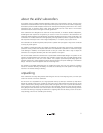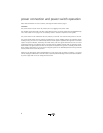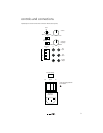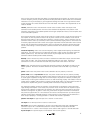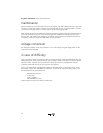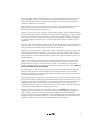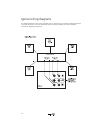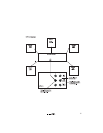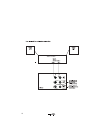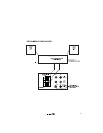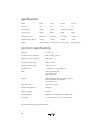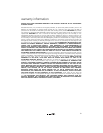
With some program material it may be difficult to hear the subwoofer, especially at low volume levels.
Turn up the volume control or the bass tone control to make the deep bass sound more obvious.
Popular, electronically produced music has more bass energy than acoustic music and will make the
sound of the subwoofer more prominent.
Buzzes and rattles: Locate the source of the noise and secure it. Place pads under loose objects that
rattle or vibrate. Noises may occur in adjacent rooms because low frequency sound can be
mechanically transmitted through walls and floors.
No power: Check the AC power connection of the subwoofer amplifier. Check all switches and fuses
or circuit breakers, which control the outlet into which the subwoofer is plugged in to. Do not plug the
subwoofer into an outlet controlled by a dimmer. Test the power outlet by plugging a normal lamp
into it to see if the outlet is active. Examine the plug and cord for damage. If the plug or cord shows
any signs of damage or wear do not use it. Contact an a/d/s/ service agency or the factory to get a
replacement.
No sound: Check the audio cables connected to the inputs of the subwoofer. Check the amplifier tape
monitor switches to be sure that they are set properly. If the high level inputs of the subwoofer are
being used make sure the speaker outputs driving them are switched on.
No deep bass or intermittent bass: The subwoofer amplifier circuitry detects operating conditions that
could damage the amplifier or the speaker. This circuitry can turn of the amplifiers output until the
overload condition has passed. When this occurs, turn down the system volume control and reset the
main power switch. Avoid operating the system in a manner that causes the protection system to be
activated frequently.
If, after a few minutes, normal bass performance is not restored there may be a serious operational
problem. In such instances the internal fuse of the subwoofer amp may have been blown. If this
happens the power indicator on the back panel will not light. Do not attempt to service the unit
yourself. Doing so will expose you to electrical shock hazards and could void your warranty. There are
no user serviceable parts in the subwoofer.
No satellite output: In systems where the low level inputs/outputs are being used, check the cables
between the high-pass output and the amplifier driving the satellite speakers. Check the speaker
selector on the amplifier to be sure the satellite speakers are selected. Also check the wires between
the satellite speakers and the amplifier.
Satellite speaker distortion at high levels: This is almost always the result of turning the system volume
up to the point where the amplifier driving the satellite speakers begins to produce distortion. Turning
up the system tone controls causes this to occur at a lower volume level than it will if the controls are
set flat. (The entire system may be distorting, but subwoofer distortion is not always obvious.)
Immediately reduce the volume level until the distortion is no longer audible. Operating the system at
levels that produce audible distortion will damage the speakers.
Amplifier does not turn off: When the power mode switch is in the Standby position, the signal
sensing circuit in the amplifier will turn it off after twenty (20) minutes if no signal is applied to the
inputs. However, when the low level inputs are used, the cable between the preamp and the
subwoofer can pickup up electronic interference. This can produce enough of an input signal to make
the signal sensing circuit keep the amplifier on. To avoid this problem keep the input cable as short as
possible and position them away from power cables and other electronic devices.
13



